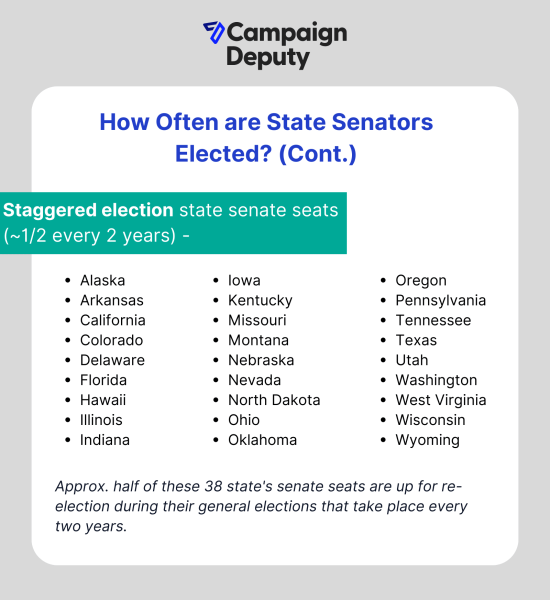Running for a state’s senate seat is not just a political endeavor, but an opportunity to make a lasting impact on your community and the lives of your constituents.
State senators have the power to make a real difference in the lives of their constituents, from education to healthcare to infrastructure.
In this comprehensive guide, we aim to equip aspiring candidates like yourself with valuable information and resources needed to run a successful campaign for your state’s senate.
Remember, your campaign will need reliable fundraising – Check out Campaign Deputy to find out where you can start.
How To Run For Your State’s Senate
We’ll look at 3 important aspects of running for a state’s senate seat, no matter where you’re running:
- How often state senator’s are elected
- Requirements to run for senate
- How to run for state senate – Starting your campaign
It’s important to know what goes into a state senate campaign before you get started.
First, let’s take a look at the overall election process for a state senator.
How Often A State’s Senator Is Elected
Since 1913, Senators have been elected into their respective seats by the public voters in their States.


Most candidates will already have a good amount of public support before running.
Usually as prominent business or social figures who want a more active role in legislative policies.
How Many Terms Can A State's Senator Serve?
Whether there are term limits for state senators depends on the state. As of 2023, 16 states have term limits for state senators.
These states are:
Arizona, Arkansas, California, Colorado, Florida, Louisiana, Maine, Montana, Nebraska, Ohio, Oklahoma, Oregon, South Dakota, Tennessee, Texas, Washington, Wyoming.
The term limits for state senators vary from state to state. In some states, senators can serve a maximum of 2 terms, while in other states, they can serve a maximum of 3-4 terms.
In some states, senators can serve a certain number of years in total, regardless of how many terms they serve.
For example, in Arizona, state senators can serve a maximum of 2 terms of 4 years each. This means that a senator can serve a maximum of 8 years in the Arizona State Senate. In California, state senators can serve a maximum of 3 terms of 4 years each. This means that a senator can serve a maximum of 12 years in the California State Senate.
States that do not have term limits for state senators allow senators to serve as many terms as they are elected to.
Requirements To Run For Senate
The general requirements to run for state senator vary from state to state, but there are some common requirements that most states have.
These requirements typically include:
- Being at least 25 years of age
- Being a citizen of the United States
- Having been a resident of your state for a certain number of years (usually 2 or 5 years)
- Being a registered voter in your state
- Meeting any other specific requirements set by your state’s constitution or election laws
There may also be qualification requirements that candidates must meet in order to on the ballot.
These requirements can vary from state to state, but they often include things like filing a petition with a certain number of signatures, paying a filing fee, or submitting a campaign finance disclosure form.
Most of which have deadlines well before the election. For example, in Kentucky, the deadline falls around January 6th for the Primary election.
Be sure to check with your state’s election board to learn about the specific filing requirements for running for your state’s senate seat.
However, another important factor you’ll need to consider is the cost of your election campaign.
Let’s take a closer look at the average cost of a state senate campaign with some real-world examples.

How Much Does It Cost To Run For State Senate?
The cost of running for state senate varies from state to state. For starters, in some states, there is no filing fee, while others have filing fees that can range from a few hundred dollars to thousands of dollars.
Here are some specific examples of filing fees for state senate races in different states:
- Alabama: $1,079.12 for Republicans and $1,034.68 for Democrats
- Florida: $400
- Hawaii: $250
- Kentucky: $200
- New Hampshire: $2
- Utah: $50 plus one-eighth of 1% of the annual salary for the position
It is important to note that these are just a few examples, and the official filing fees for state senate races are often listed on a state election office’s website.
In addition to the filing fee, there are other costs associated with running a campaign, such as:
- Advertising
- Fundraising
- Staffing
- Website development
- Travel
- Printing
- Mailing
The total cost of running a campaign can be significant, and it can be even more expensive in competitive races.
Running for a state’s senate seat requires a lot of investment, both financially and in terms of your own time.
The cost of running for state senate can be a barrier to entry for many people. However, there are a number of resources available to help candidates raise money and get their message out. These resources include the state party, political action committees, and individual donors.
Consider using a multi-channel fundraising platform like Campaign Deputy if you want to raise money and save time with easy-to-use fundraising tools.
What Do You Need To Run For Your State’s Senate
Here are 5 things you’ll need to begin your campaign for a seat in your state’s senate.
#1 Register your candidacy
Before starting your campaign, you’ll need to complete a Statement of Candidacy with the Secretary of State. These forms are most often available through your state’s Board of Elections website.
These filings typically must include the following:
- Your name
- Your address
- Your date of birth
- Your party affiliation (if applicable)
- Your signature
- The office you are seeking
And once you’ve paid your filing fee, you’re ready to start campaigning!
#2 Fundraising Campaign
Election campaigns at the state’s senatorial level will require a professional fundraising strategy if you wish to stand a chance of winning.
The more public exposure and endorsements you can get, the better your chances of raising funds and winning votes.
With the average state senate campaign costing anywhere between $80,000 and $1 million in fundraising alone, you’ll need to prioritize this in your own campaign too.
Fortunately, proven platforms like Campaign Deputy exist that make fundraising easy.
Remember: It’s important to run your campaign finances correctly from day one, or risk getting yourself disqualified from the race for breaking fundraising rules.
#3 Personal Branding And Voter Engagement
Winning a seat in your state’s senate all comes down to your public persona.
Essentially, what does the voting public know about you, your beliefs, and your policies?
It’s important to distinguish yourself from your competitors so voters look for you on the ballot.
Increase your brand awareness by:
- Interacting with the public on social media
- Appearing in the news and other media like podcasts
- Participating in public debates with other candidates
- Texting and emailing outreach to donors and voters
- Using lawn signs and other print media
- Running paid ads on TV and social media
The success of your state senatorial campaign depends on people remembering your name, and campaign branding like your logo, slogans, policies, and any other forms of persuasive messaging.
Maintaining brand consistency and using confidence-building messaging will help you connect with the voting public and win their favor.
#4 Campaign Staff
At the state senatorial level, you’re going to need the support of a strong and loyal campaign team.
The team that keeps your campaign running smoothly by organizing public events, managing campaign finances, canvassing and data entry, and pretty much any support you need to win your seat.
For an effective campaign, you’ll need a minimum of 6-7 staff members:
- Campaign Manager
- Finance Director & Treasurer
- Field Director
- 2-3 Field Staffers (events organizers)
The more competitive your election cycle, the more staff you’re going to need to break through the noise and get your message out to the voters.
#5 Endorsements
Networking is one of the most important skills you’ll learn working in politics.
Your goal should be to connect with as many respected and well-known people and companies, and get them to endorse your candidacy – lending you credibility in the eyes of their fans and supporters.
Connecting with as many different communities of people will widen your sphere of awareness and influence.
Examples of public figures to approach for endorsements include celebrities, athletes, prominent businesses, religious leaders, and other respected politicians.
Endorsements are valuable social proof that increases public confidence in you and your campaign.
In Summary
Here’s how to run for senator of your state:
- Research your competitors and get to know the rules of campaigning for your state’s senate
- Register your candidacy and recruit your campaign support staff
- Design your campaign media and establish your public messaging
- Start your fundraising campaign and network with public figures to attract endorsements
- Engage with voters on various levels to gain attention and win votes
Now you know what it takes to win a seat as a senator representing your state.
We wish you the best of luck in your campaign! Get in touch if you need any help raising funds.




